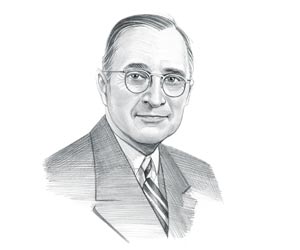|
|
|
|
|
The Marshall Plan was a US-financed relief package, providing funds to European nations to assist their reconstruction after the devastation of WW2. The Mutual Defense Assistance Act, aka the Military Marshall Plan, was passed by US Congress in October 1949 authorizing the US government to supply equipment, military aid and support to nations at risk from communism. The Marshall Plan was essential for the success of the US policy of containment. Facts about
Marshall Plan The Marshall Plan was named for United States Secretary of State George Marshall. It was largely the creation of State Department officials, especially George F. Kennan and William L. Clayton. After World War 2 the United States had become increasingly alarmed at the rising power of the USSR and the spread of Communism in the 'Satellite Nations' behind the Iron Curtain. President Harry Truman made a speech to Congress on March 27, 1947 that became known as the Truman Doctrine. His speech was in response to the Turkish Straits crisis and Greek Civil War (1946–1949) in which Communist rebels were only prevented from taking over the country by the British Army. Truman was also a proponent of the Domino Theory. The British, devastated by the destruction caused to the country in WW2, could no longer afford the expense of providing military aid. President Truman stated in his speech that it was the duty of the United States to provide aid to worn-torn countries and to quash the communist aggression in Turkey and Greece. The Truman Doctrine advocated the policy of Containment that was aimed at restricting USSR expansion by keeping communism within its present territory by diplomatic, military and economic actions. In June 1947, George Marshall went to Europe. Most major European cities had been badly damaged by the bombing during WW2 and lay in ruins. Millions were homeless. Roads, railways and bridges had been destroyed. Industrial production was hard hit as was agriculture which had led to serious food shortages. On June 5, 1947 George Marshall gave a speech to the graduating class of Harvard University in which he stated that the US government was prepared to contribute to European recovery. The Marshall Plan called for the Europeans to meet and create their own plan for rebuilding Europe, and that the United States would then fund this plan. Marshall's speech had deliberately included an invitation to the Soviets to attend the meeting, as excluding them would have been a clear a sign of distrust and inflame the already growing tensions of the Cold War. The invitation was purely diplomatic, he knew that the Russians would decline to participate The Marshall Plan had a low profile in America but received considerable publicity in Europe. The British Foreign Secretary Ernest Bevin contacted French Foreign Minister Georges Bidault to begin preparing a European response to the US offer. The USSR, also playing the diplomatic game, sent the Soviet foreign minister Vyacheslav Molotov to Paris to meet with Bevin and Bidault. The French and the British put forward plans for the creation of a unified European economy. The idea was completely incompatible with the strict Soviet economic policies. Vyacheslav Molotov left Paris, totally rejecting the plan. The Soviet press claimed that the Marshall Plan was an American-run program and denigrated the idea as "a plan for interference in the domestic affairs of other countries". The USSR and the 'Satellite Nations' of Eastern Europe established their own economic program called Comecon. On July 12, 1947 a larger meeting was convened in Paris with nearly every country of Europe invited. Sixteen countries accepted the invitation and the process of long and complex negotiations began. The 16 countries that signed up to the Marshall Plan were Austria, Belgium, Denmark, France, Greece, Iceland, Ireland, Italy, Luxembourg, the Netherlands, Norway, Portugal, Sweden, Switzerland, Turkey and the United Kingdom. As a result of the reconstruction meeting and negotiations the 16 European countries sent a reconstruction plan to Washington asking for $22 billion in aid. President Truman cut this to $17 billion in the bill he put to Congress but further cuts were made. The initial aid was for $5 billion but Congress would eventually donate $12.4 billion over the four years of the Marshall Plan. 70% of the money was used to buy commodities from suppliers in the United States. $3.2 billion was spent on food and fertilizers, $3.5 billion was spent on raw materials, $1.9 billion was spent on machinery and vehicles and $1.6 billion was spent on fuel. President Truman signed the Marshall Plan into law on April 3, 1948 covering foreign aid and created the Economic Cooperation Administration (ECA) to manage the Marshall Plan. The Marshall Plan ended in 1951, as originally scheduled. The program was not extended due to the entry of the United States into the Korean War in 1950 |
| US American History |
| 1945-1993: Cold War Era |
| Truman Doctrine |
|
|
|
|
|
First Published2016-04-19 | |||
|
Updated 2018-01-01 |
Publisher
Siteseen Limited
| ||
|
|

